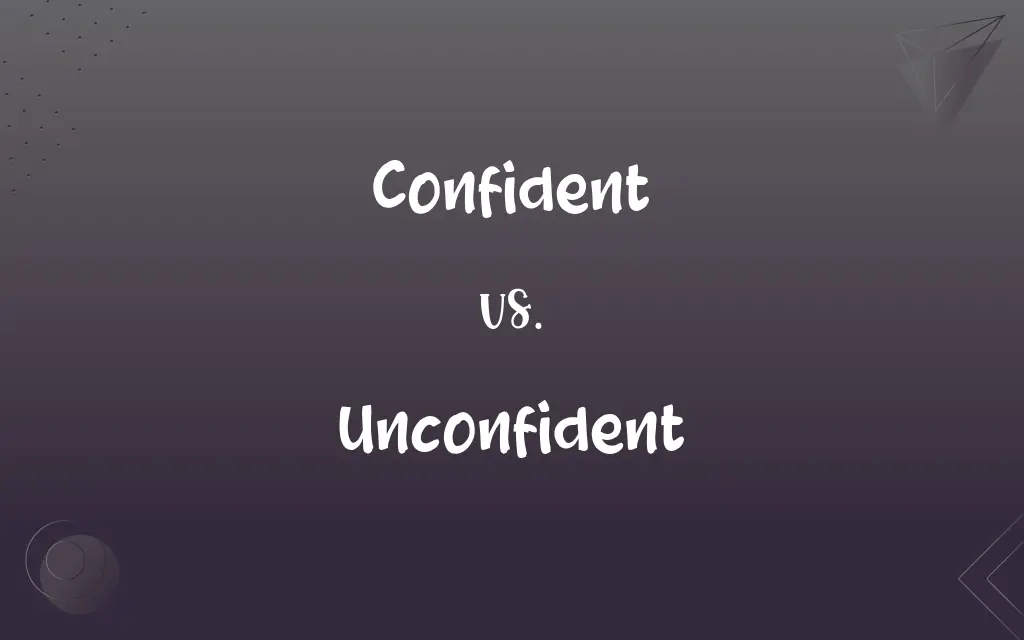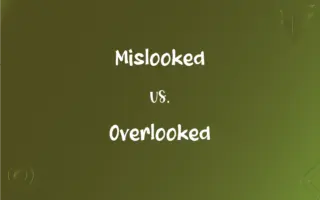Confident vs. Unconfident: What's the Difference?
Edited by Janet White || By Harlon Moss || Updated on November 18, 2023
Confident means assurance in oneself; Unconfident means lack of self-assurance.

Key Differences
Confidence is characterized by a strong sense of self-assurance and belief in one's abilities, often manifesting as a calm and assertive presence. It involves trusting one's judgment and capabilities, which leads to taking actions with decisiveness and clarity. In contrast, a lack of confidence, or unconfidence, is marked by self-doubt and hesitation. Unconfident individuals may question their skills and decisions, leading to indecision and a reluctance to take bold steps. Where confidence radiates certainty and inspires trust in others, unconfidence often results in second-guessing oneself and seeking reassurance from others.
A confident person typically makes decisions with a sense of decisiveness, backed by the belief that their choices are sound. This decisiveness often leads to quicker and more efficient decision-making processes, as a confident individual is less likely to be swayed by external opinions. On the other hand, an unconfident person may struggle with indecisiveness, frequently changing their mind or delaying decisions due to fear of making the wrong choice. This hesitancy can stem from a deep-seated fear of failure or criticism, hindering their ability to commit to a course of action.
In social situations, confidence often translates to a more engaging and outgoing demeanor. Confident individuals are usually comfortable initiating conversations, expressing their opinions, and navigating social settings with ease. They are often perceived as charismatic and approachable, drawing others towards them. Conversely, unconfident individuals might appear withdrawn or shy, possibly struggling with initiating interactions or voicing their thoughts. This can be due to a fear of judgment or a belief that they are not interesting or worthy enough to contribute to social exchanges, leading to a more reserved or cautious approach in group settings.
The distinction between confidence and unconfidence is also evident in body language and communication styles. A confident person typically exhibits assertive body language, such as maintaining eye contact, standing tall, and using clear, articulate speech. These physical expressions of confidence can enhance their ability to communicate effectively and assert themselves in various situations. In contrast, an unconfident person may display more passive body language, including avoiding eye contact, slouching, and speaking in a hesitant or low tone. Such non-verbal cues can inadvertently communicate a lack of self-assurance, affecting how they are perceived and interacted with by others.
When faced with challenges or criticism, a confident person typically demonstrates resilience. They are more likely to view setbacks as opportunities for growth and are not easily discouraged by negative feedback. Their self-assured nature allows them to separate constructive criticism from personal attacks, using it as a tool for improvement. In contrast, an unconfident individual may be more sensitive to criticism and challenges. They might take negative feedback personally, leading to feelings of inadequacy or discouragement. This sensitivity can make it harder for them to bounce back from setbacks, as they may dwell on failures rather than seeking ways to overcome them.
ADVERTISEMENT
Comparison Chart
Self-Perception
Positive self-image
Negative or doubtful self-image
Decision-Making
Decisive and assertive
Hesitant and uncertain
Risk-Taking
Willing to take calculated risks
Avoids risks due to fear of failure
Body Language
Open and assertive posture
Closed or defensive posture
Communication
Clear and assertive speech
Often vague or tentative speech
ADVERTISEMENT
Confident and Unconfident Definitions
Confident
Certain.
He was confident that his plan would succeed.
Unconfident
Hesitant.
Her unconfident voice barely rose above a whisper.
Confident
Bold.
Her confident speech inspired the audience.
Unconfident
Insecure.
He was unconfident about his decisions.
Confident
Self-Assured.
She walked into the interview room confident and prepared.
Unconfident
Doubtful.
He felt unconfident about his presentation skills.
Confident
Unwavering.
He remained confident under pressure.
Unconfident
Timid.
Her unconfident stance made her seem less authoritative.
Confident
Optimistic.
She was confident about her future prospects.
Unconfident
Pessimistic.
She was unconfident about the project's success.
Confident
Feeling or showing certainty, as of success
Was confident that the venture would be profitable.
Unconfident
Not confident.
Confident
Feeling or showing confidence in oneself; self-assured
A confident driver.
Unconfident
Lacking or marked by a lack of confidence
Confident
(Obsolete) Confiding; trustful.
Confident
Very sure of something; positive.
I'm pretty confident that she's not lying, she's acting normally.
He was confident of success.
Confident
Self-assured, self-reliant, sure of oneself.
Confident
Forward, impudent.
Confident
Obsolete form of confidant
Confident
See Confidant.
Confident
Having or marked by confidence or assurance;
A confident speaker
A confident reply
His manner is more confident these days
Confident of fulfillment
Confident
Persuaded of; very sure;
Were convinced that it would be to their advantage to join
I am positive he is lying
Was confident he would win
Confident
Not liable to error in judgment or action;
Most surefooted of the statesmen who dealt with the depression
Demonstrates a surefooted storytelling talent
FAQs
How does "unconfident" differ from "confident"?
Unconfident signifies a lack of self-assurance, contrary to confident.
Is "unconfident" a permanent trait?
No, being unconfident can change with personal development and experiences.
Can confidence be learned?
Yes, confidence can be developed through practice and positive experiences.
Do unconfident people avoid challenges?
Often, unconfident individuals may shy away from challenging situations.
Is being unconfident always negative?
Not necessarily; it can lead to caution and careful decision-making.
Can confidence be faked?
Yes, people sometimes exhibit false confidence to mask their insecurities.
Can confidence be mistaken for arrogance?
Yes, excessive confidence can sometimes be perceived as arrogance.
What does "confident" mean?
Confident refers to having a strong belief in one's abilities or ideas.
Do confident people ever feel unconfident?
Yes, confident people can experience moments of doubt or uncertainty.
How can one build confidence?
Through positive experiences, skill development, and self-reflection.
Does unconfidence affect learning?
Yes, it can hinder participation and risk-taking in learning environments.
What role does confidence play in leadership?
Confidence is crucial in leadership for decision-making and inspiring others.
Are unconfident people less successful?
Not necessarily, but confidence often aids in achieving success.
How does confidence affect communication?
Confidence typically leads to clearer and more assertive communication.
How does body language show confidence?
Confident body language includes an upright posture and direct eye contact.
What are the signs of an unconfident person?
Signs include hesitant speech, nervous habits, and avoiding eye contact.
Can unconfidence be beneficial?
Yes, it can lead to more cautious and thoughtful actions.
How does unconfidence affect relationships?
It can lead to miscommunication and a lack of assertiveness in interactions.
Can unconfident people lead effectively?
Yes, with the right support and development, they can be effective leaders.
Is confidence innate or developed?
Confidence can be both innate and developed over time.
About Author
Written by
Harlon MossHarlon is a seasoned quality moderator and accomplished content writer for Difference Wiki. An alumnus of the prestigious University of California, he earned his degree in Computer Science. Leveraging his academic background, Harlon brings a meticulous and informed perspective to his work, ensuring content accuracy and excellence.
Edited by
Janet WhiteJanet White has been an esteemed writer and blogger for Difference Wiki. Holding a Master's degree in Science and Medical Journalism from the prestigious Boston University, she has consistently demonstrated her expertise and passion for her field. When she's not immersed in her work, Janet relishes her time exercising, delving into a good book, and cherishing moments with friends and family.































































